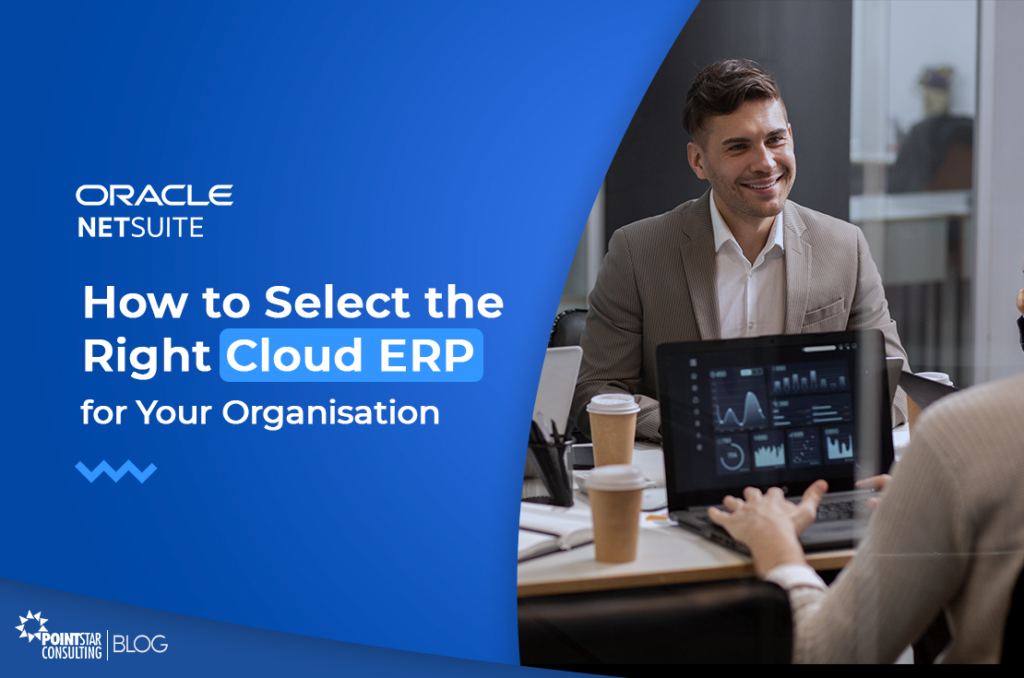Selecting the right cloud ERP (Enterprise Resource Planning) system is a critical decision that can have far-reaching effects on an organisation’s operations and overall success.
Cloud ERP systems serve as comprehensive software solutions that integrate various business functions and processes, such as finance, human resources, inventory management, customer relationship management, and more. They provide a centralised database and a unified platform for data management, analysis, and decision-making, making them vital tools for modern businesses.
The benefits of implementing the right cloud ERP system are substantial, including increased efficiency, improved collaboration, better data visibility, streamlined processes, enhanced customer service, and optimised resource allocation.
However, the process of selecting the appropriate cloud ERP solution can be overwhelming due to the abundance of options available in the market. This article aims to simplify the cloud ERP selection process by providing valuable insights and guidelines to make an informed choice that aligns with your organisation’s unique needs and goals.
Preparing for Cloud ERP Selection: Identifying Pain Points and Re-evaluating Options
Identifying the Pain Points
Before diving into the selection process, it’s essential to identify the pain points and challenges faced by your organisation.
Common issues that indicate the need for a cloud ERP solution include labour-intensive and error-prone processes, manual data transfers between applications, lack of visibility into business operations, and stale, inaccurate, or incomplete business data. Addressing these challenges is crucial for achieving enhanced efficiency and data accuracy.
Evaluate Cloud ERP Options
The first step in selecting the right cloud ERP is to evaluate your organisation’s needs and future requirements. List the modules that deliver immediate benefits and those that will be essential a few years down the line. For new implementations, cloud-based ERP solutions often present the natural choice, providing security, scalability, and cost-effectiveness.
Confirm Your Strategy
Consider your cloud ERP implementation strategy carefully. Implementing cloud ERP in stages can reduce risks compared to a “big bang” all-at-once deployment. Running legacy systems in parallel for a certain period may also be worthwhile for a smoother transition. Define your strategy based on your organisation’s unique circumstances and objectives.
9 Questions to Ask Cloud ERP Vendors
When evaluating Cloud ERP vendors, you can consider these following essential questions:
System Costs
How does the vendor structure their pricing for the current product and future capabilities we may require? What is the process for handling upgrades, new releases, and bug fixes?
Implementation
What is the estimated cost of implementing the cloud ERP system? How can we prevent potential cost increases during the project, and how do we manage scope creep?
Configurability
Does the vendor understand our specific needs and processes? Is the cloud ERP system flexible enough to accommodate customisations, and how are these handled by the vendor’s implementation team?
User-Friendliness
Does the vendor understand our specific needs and processes? Is the cloud ERP system flexible enough to accommodate customisations, and how are these handled by the vendor’s implementation team?
Timeline
What is the expected duration of the cloud ERP implementation, and will it disrupt our current operations? How has the implementation process been for similar customers, and what resources will our company need to provide during the implementation?
Project Management
Will the vendor collaborate with us to create relevant milestones for success? How will the milestones be tailored to our business needs to ensure everyone sees progress during the implementation?
Updates
How does the vendor deliver updates to the cloud ERP system? Are new features provided at an additional cost, and do updates require expert assistance for installation?
Data Migration
How will the vendor handle the migration of data from our old business systems to the new cloud ERP? Does the vendor have experience with data migration from systems similar to ours?
Add Ons
Are there various modules provided by the vendor that we can add as per our requirements? Does the vendor have a wide network of partners offering ready-made integrations and specialised features? How straightforward is the process of adding new users or functionality to the cloud ERP system
Key Cloud ERP Capabilities
Consider the following popular cloud ERP capabilities to meet your organisation’s needs:
Accounting
Automate AP and AR processes, updating general ledgers and sub-ledgers in real-time.
Financial Planning and Analysis
Forecast future sales, expenses, and project outcomes.
Inventory Management
Track product movement across the supply chain and monitor inventory levels.
Order Management
Efficiently route orders and track their progress from receipt to delivery.
Professional Services Automation
Monitor project progress and manage billing and expenses.
Manufacturing
Create production schedules and coordinate resources to meet production plans.
CRM
Record customer communications, manage sales leads, and basic marketing campaigns.
Conclusion
Selecting the right cloud ERP system is a critical step in driving operational efficiency and achieving business success. By identifying pain points, evaluating cloud ERP options, confirming your strategy, and asking the right questions, you can streamline the selection process and ensure the cloud ERP system aligns perfectly with your organisation’s unique needs and goals. With the right cloud ERP in place, your organisation can thrive in the ever-evolving business landscape.



